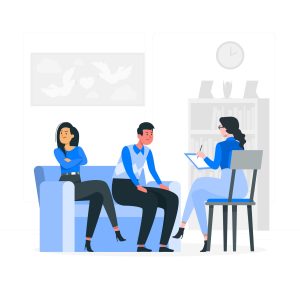
Trauma In Relationships: The Hidden Barrier To Love And Connection
Trauma can create a lens through which you view the world as an unsafe, unpredictable, and unwelcoming place. This distorted view can extend to your

Trauma can create a lens through which you view the world as an unsafe, unpredictable, and unwelcoming place. This distorted view can extend to your

So, you have tried having “the conversation” with your partner about going for couples counseling. You went in with hope, and a tinge of excitement

“I was seeing someone I met online. We went on a few dates and things seemed to be going well. All of a sudden no

Sexual difficulties are about as common as eating or sleeping disorders. Research shows that sexual dysfunction affects about 43% of women and about 31% of

Often, when we feel overwhelmed in our day to day lives, we wish to share our feelings, thoughts and perspectives with people who are part of our lives. We share these for several reasons – to feel validated, to find an emotional release, to ‘sort things out’ as we speak, and so on. Underlying many of these reasons is the need to be understood. However, sometimes it feels like they have misunderstood us, or have not completely understood. The feeling of being constantly misunderstood by people close to us can deeply impact us.

Conventional knowledge tells us that pornography is bad, damaging our psyches and ruining our relationships. However,
watching porn does not necessarily have to ruin your sex life; it can also turn your sex life around, in an adventurous way. Porn can at times, serve to stimulate desire and serve as a release for physical and emotional needs.

In a relationship, sex and physical intimacy play an important role and over the years, it has come to a place where both men and women desire sex. Studies have repeatedly linked sexual satisfaction to overall relationship satisfaction. However, many of us still feel uncomfortable exploring sex in relationships or even talking about it; we tend to put it on the backburner. In this article, we talk about why we shy away from sex, the importance of sex in relationships and how we can accept and embrace our needs and desires.

In the newest rung of society, there is an increasing number of people who find that they want a different life for themselves. Of the several small and big changes that people choose to make in their lives, one of the major ones is choosing not to have children. The realization that you do not want to have children can come with a lot of confusion, concern and some anxiety.

You are in a whirlwind of emotions, following the discovery of your spouse’s affair. Your perceptions and thoughts could be hugely affected and can greatly influence your decisions. This article has pointers from our team that can help you undertake this journey from the initial discovery to eventual decisions in as healthy a way as possible.

While the world looks at someone involved in an extramarital relationship as a culprit, as psychologists we understand that it is no easy space to be in. There are real psychological struggles involved.
In this article, which is part II of our series of three articles on extramarital affairs, we have focused on the struggles of the person who is involved in an extramarital relationship and have offered some insights to work towards a possible resolution.

We specialize in combining psychotherapy with deep wellness practices like mindfulness and meditation and creating a customized mental health plan for individuals and organisations.
We specialize in combining psychotherapy with deep wellness practices like mindfulness and meditation and creating a customized mental health plan for individuals and organisations.

A young woman from another country moved with her family to live for one year in a town near the monastery. When, in the course of the year she discovered the monastery, she would periodically visit to have discussions with the Abbess. The Abbess introduced her to meditation, which became very meaningful for the young woman.
When the family’s year-long stay was drawing to an end, the young woman asked the Abbess, “In my country there is no Buddhism and no one has even heard about meditation. How can I continue to learn and deepen the practice you have started me on?”
The Abbess said, “When you return home ask far and wide for who, among the wise people, is recognized as having the greatest ability to listen. Ask that person to instruct you in the art of listening. What you learn about listening from such a person will teach you how to further your meditation practice.
― Gil Fronsdal, A Monastery Within: Tales from the Buddhist Path